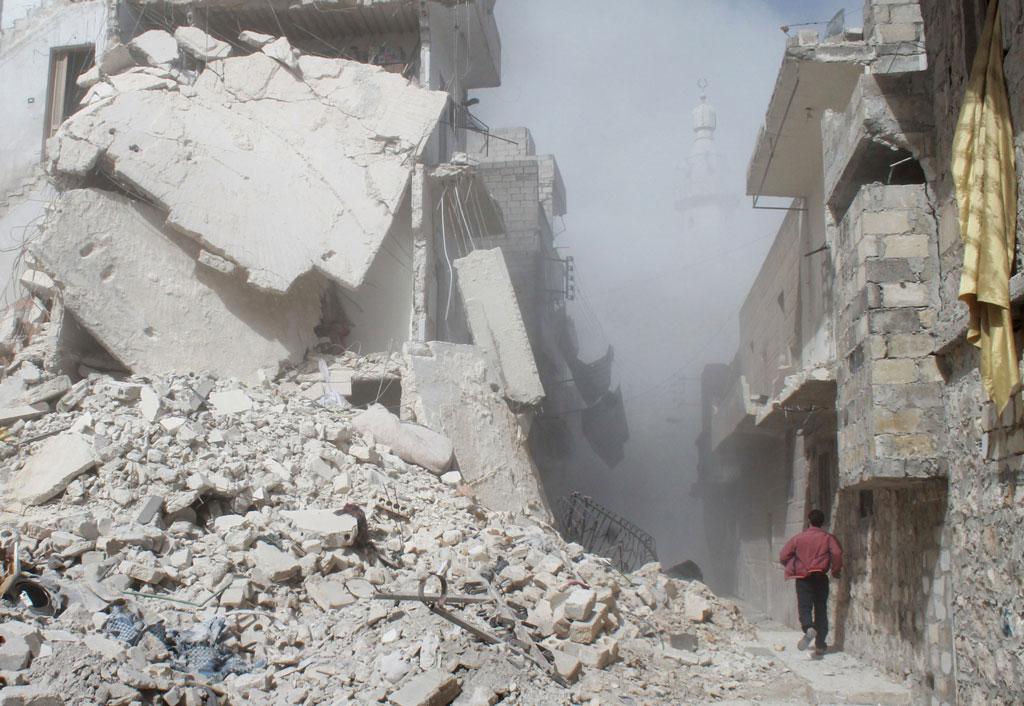It’s simpler when war is binary. Easier to understand – and discuss – when one side is winning, and the other is losing. When it comes to Syria, which entered its fourth year of civil war this spring, many policymakers and media elites here have fallen into the binary trap, suggesting that President Bashar Al Assad is the inevitable victor, and characterizing his snowballing power as inexorable.
But that prevailing assumption is not only inaccurate, it might also be dangerous. And as the Obama administration may soon begin constructing a new Syrian humanitarian strategy – the aim of Resolution 384, which just passed in the Senate and is under review in the House – it’s critical that the architects of any new policy be aware of the realities on the ground.
First, who believes what – and why is it flawed? The perspective of Senator John McCain exemplifies the prevailing assumption that Assad’s position has been bolstered in recent months. “Any objective observer will tell you that Bashar Assad is winning on the battlefield,” said McCain in a Senate committee testimony.
James Clapper, the Director of National Intelligence, cites the chemical arms removal agreement with Russia as a strategic “win” for the Assad regime. “The prospects are right now that Assad is actually in a strengthened position than when we discussed this last year, by virtue of his agreement to remove the chemical weapons, as slow as that process has been,” Clapper stated.
A recent article in the Washington Post states that the regime has also gained control of Damascus, the capital and second largest city in Syria. And it looks like the opposition forces are falling apart: deepening rifts among rebel forces are directing resources and attention away from the opposition’s efforts to overthrow the regime. These developments, underscored by the second round of failed Geneva peace talks in February and the regime’s recent capture of three rebel-held towns, have solidified the international perception of Assad’s growing and seemingly unstoppable strength.
That’s exactly what Assad wants you to believe, suggested Oubai Shahbandar, a senior advisor at the Syrian National Coalition. The Assad regime, Shahbandar explained at a recent New America event, has gone to great lengths to project the image that they are gaining territory and crushing the opposition. In reality, the government has suffered immense damages at the hands of rebel forces and is now heavily dependent on foreign fighters sponsored, trained, and equipped largely by the Iranian Revolutionary Guard’s Quds Force and Lebanese Hezbollah.
Let’s set the record straight on Assad’s land control, too: In his testimony to Congress, counterinsurgency expert Dr. David Kilcullen stated that 75 percent of Syrian land is heavily contested or controlled by opposition forces, a statistic that suggests Assad’s recent territorial conquests are drastically overemphasized. What’s more, revolutionary forces recently launched a joint offensive in the mainly pro-regime Latakia province. This may potentially open up a new rebel supply line from Turkey, which would threaten regime control of a key coastal province.
But here’s the key. These strategic “wins” don’t mean rebel groups are pulling ahead, either. The war is more like a never-ending game of chess, where neither side can seem to advance far enough to yell checkmate.
“Neither the regime nor the rebels can achieve outright military victory, yet both sides still believe they can win and are escalating violence to improve their position,” Dr. Kilcullen said.
Indeed, noted the panelists, the situation in Syria is an “escalating conflict” where both the Assad regime and opposition forces are pursuing increasingly violent tactics.
This escalation makes it even more urgent for the United States to refocus its energy on how to reach a ceasefire in Syria, rather than ricocheting from the latest – often inaccurate – game-like assessments. “We can continuously look at who’s in control of what and what’s happening in what part of the country militarily, but ultimately, the debate really overlooks the fact that whoever is winning militarily is not necessarily winning the peace,” said Leila Hilal, the director of New America’s Middle East Task Force and another speaker at the event.
As international news headlines continue to broadcast stories of human suffering and flash a virtual scoreboard of battle outcomes, the call to action from the international community – most recently the United States – is getting louder: We can no longer sit by idly and observe Syria’s agony, the community says.
On April 7, U.S. Senators Tim Kaine (D-VA) and Marco Rubio (R-FL) responded to that call, introducing the Syrian Humanitarian Resolution of 2014. It passed unanimously in the Senate. If it passes in the House, this bipartisan resolution will require President Obama to develop and submit a more robust U.S. strategy for addressing the humanitarian disaster in Syria to Congress within 90 days. Resolution 384 condemns violence against innocent Syrian civilians, supports the immediate implementation of United Nations Security Council Resolution 2139, and calls for transnational assistance.
This could be a good start – but there’s more long-term work to be done, suggested Nathaniel Rosenblatt – Middle East and North Africa analyst at Caerus Associates and co-author of Zooming in on Syria: Adapting U.S. Policy to Local Realities. As he points out, strictly providing humanitarian assistance does little to address long-standing civilian vulnerabilities.
Syrians need more consistent aid rather than a rapid, short-term influx of support, he said. Humanitarian aid must also become less politicized, a factor that creates conflicts among beneficiaries in the region.
“Perhaps more important is this aid effort will continue to suffer unless it includes a more robust enforcement mechanism to ensure basic civilian needs do not suffer under the whims of combatants who show little interest in putting down their guns,” Rosenblatt said.
For now, Syria remains in its escalating conflict. And that means the entire world is losing.
Jessica Ovington is an editorial intern at New America. She graduated in 2013 from the University of Georgia with a B.A. in International Affairs and will be attending King’s College London for their Intelligence & International Security Master’s program in the fall of 2014. This article was originally published in The Weekly Wonk, New America’s digital magazine.

